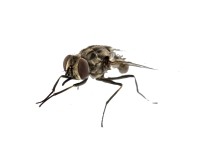Flies Control
Flies Control
Pest Control and Management
Flies Control
Flies can be a nuisance and carrier of disease-transmitting organisms. A housefly can transfer pathogenic organisms to humans through infected food. Some of the flies which infest your home are; house flies, fruit flies, cluster flies, and drain flies. These are the most common flies which enter homes and any buildings during the spring and summer months. House flies complete their life cycle in a week. The housefly is a transmitter of more than thirty diseases. Flies control is very important to stay disease-free.
Cluster flies look like house flies but their sluggish behavior and overlapping wings distinguish them from house fly. They enter through walls, attics, and window frames. They emerge in large numbers inside or outside of windows during early spring on warm days. Drain flies are small-sized with short and hairy bodies. They breed in drains and fly in different parts of the house.
The most common reason for flies swarming all over your house is an infestation inside or nearby your home. If you suddenly see a swarm of flies that means dozens of eggs have already hatched and developed into flies. The source is likely inside your house, garage, attic, or garden.
Life Cycle Of Fly
When a female fly finds a place favorable to lay eggs. It will lay eggs on rotting wood or food. Some species of fly also lay eggs on corpses of animals or other rotting flesh. The average female fly can lay around 150 eggs at a time. Once the eggs hatch, they come out as limbless white creatures known as maggots. They will feast on the rotting food or flesh around them to continue to grow. Maggots can remain in the larval stage from a few hours to a couple of days.
The fly maggot then enters the pupal stage, which is a lot different from the larval stage. Fly pupae appear larger, and their skin changes color, often yellow, red, brown, or black, and no longer look as cylindrical as they do as maggots. The fly pupa tries to find a quiet, dark, place to go through this stage. During this stage, flies start to develop wings, legs, and the rest of the shape of your average housefly.
Finally, the fly turns into an adult. They will then fly off and find places to feed and, eventually, for a new place to lay eggs and start the process all over again.

Experienced Epro Pest Control team by using the best techniques can give you a guaranteed peace of mind. For guaranteed work please call us at 416-834-3789 or email us at info@epropestcontrol.ca


